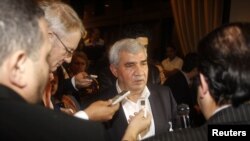Syrian opposition groups have elected a moderate cleric, Maath al-Khatib, as the first leader of a new coalition that unites the disparate factions fighting to end the rule of President Bashar al-Assad.
Businessman Riad Seif, who proposed the U.S.-backed initiative to establish an umbrella organization of Syrian- and external-based opposition, was elected vice president on Sunday. Suhair al-Atassi, a well-known female activist, also was elected vice president.
Khatib, a former imam at the Umayyad mosque in Damascus, was imprisoned several times for criticizing Mr. Assad's rule before he left Syria this year.
Seif had drawn up the U.S.-backed reform proposals on which Sunday's agreement, reach in Doha, was based. Opposition figures had struggled to achieve unity, under pressure from U.S. diplomats and officials from Qatar, which have supported Syrian opposition activity since an uprising began last year.
The deal came after the Syrian National Council, which had formerly been seen as the main representative of the opposition, heeded Arab and Western pressure to agree to a new structure embracing groups that had been unwilling to join its ranks.
Meanwhile, Israeli troops fired warning shots into Syria after stray munitions from fighting between Syrian troops and rebels landed in Israel's Golan Heights area.
The military said in a statement Sunday that a mortar shell landed near an Israeli army post in the Golan Heights. It says that Israeli soldiers fired warning shots in response.
The statement adds that the army filed a complaint through the local United Nations forces warning that "fire emanating from Syria into Israel will not be tolerated and shall be responded to with severity".
Israel public radio said the incident was the first direct engagement between Israel and Syria since the countries' 1973 war.
Moderate Syrian Cleric to Lead Opposition
- By VOA News





